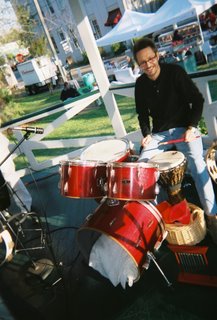my first song, Laughin' Blues
A few days ago I wrote my first song– quite by surprise to myself, I must say–a blues song, a real song which I can imagine my band giving a try; & then I immediately recorded myself "singing" it (I really cannot sing) while quietly tapping on my djembe (It was 4AM; I wasn't alone in the house). Then I listened to it & laughed my ass off the entire time (only a minute & a half or so, I guess).
Laughin' Blues (Zen Blues)
(G. T. Meek, 2006)
(1) I got the blues but I’m laughin’
I got the blues but I’m laughin’
I’m laughin’ but I got the blues
(2) My woman done told me...
–You laughin’ at me?
My woman done told me...
–You laughin’ at me?
My woman done told me
She settin’ me free
(3) I got the blues ‘cause I’m laughin’
I’m laughin’ ‘cause I got the blues
You give me a glass of water, now baby,
I’ll throw it all over you
–& me too
(4) Laughin’ blues, laughin’ blues
Laughin’ blues, laughin’ blues
Blue laughin, laughin blues
As I reread & re-listen to it, I realize I may have written (or transcribed, because that's what it felt like I was doing) a fairly deep & cohesive & cogent lyric. Obviously, the notion of laughing at suffering & suffering through laughing would represent a Zen-like contradiction; or could be seen as a contemporary koan, as, certainly, could many blues verses before mine. Also, later, I say I have the blues because I’m laughing, & I’m laughing because I have the blues, which kind of twists it a little. Then, I start to say the old line "My woman done told me...", 2 times, each time interrupting myself with a sudden question seemingly addressed to my listener: "You laughin’ at me? This paranoid scene of encounter with the singer’s audience or interlocutor performs or enacts some extensive & somewhat ambiguous playing (playing music, playing with words, playing with rhetoric, with relation). Is the laughter real, is an Other there present and speaking? & if so, is the laughter prompted by the listener’s prior knowledge of what the woman’s "done told him"; or is it prompted by the listener’s knowledge that "my woman done told me" is a long-used formulaic blues line that "you can’t do anything new with"? It is indeed that very fact, of that particular line as a formulaic cliche or set-piece that it would seem to be impossible to make new, that I believe I have made some headway toward overcoming in this lyric, as follows. By anticipating & calling forth the question, by raising the objection himself, like Socrates, like a Zen master, &, as well, because he’s already laughing, the singer is able to bring the listener into the dialogue first, so to speak, by laughing at himself for his own use of such on old saw before the other gets the chance to, & thus being the one who deflates his own self-seriousness in this poking of fun at one’s own writing. By being the one who first addresses the other, who initiates communication, & who then uses it to simultaneously deprecate himself & invite the Other into the song, to respond to the song, to speak, even, the singer of the lyric achieves at least a partial reversal of the author’s own belatedness, my latecoming to the tradition of the blues, by thus participating in the earliness & firstness of the (mostly unknown) originators of such lines. (This is the same temporal overcoming which my "favorite" critic Harold Bloom speaks of as central to the Jewish myth of existence, a return to the scene of Creation itself, & so to origins.) (This is, of course, not to even mention the question of whether my lily-white, middle-class, "Liberal-guilty" Southern ass has any ^%$#@+= business writing any blues songs, Zen-clever or not.)
The concluding lines, "My woman done told me/She settin’ me free", put a new spin on things, because in Zen terms, the freedom I receive could be a positive experience & value, an opening & lifting up rather than a betrayal or a harmful or painful experience, not a severing but a joining at a higher level, a different, or differently seen, relation, such as a relation of muse to artist, or of guru to devotee (that is, the relation of shaktipat, in Hindu or Kundalini terms).
The glass of water that ends up getting the singer & his "baby" wet may be said to introduce a sexual &/or mystical element (to flow a pun). Water has often been seen as representing feminine or hidden or unconscious or subconscious or religious or creative themes, & it surely calls up imagery of a sexual nature in this context, with the singer, the man, casting the woman as the cause of his "glass of water", "giving" it to him, & making him spill it "all over you/–& me too". I added the "& me too" because I didn’t want it to be too straightforwardly conventional & literal about the sexuality, I wanted it to be able to really be a glass of water, as well. At the outro, I don’t know whether "Blue laughin’" means anything. I guess it could be read as someone’s name, either the singer or his woman or the listener. I just like it.
Musically, I think I didn’t follow a very regular form. Are the last 3 lines of verse (3) the "change" part? Or is verse (2) the bridge? Is every verse a refrain? I don’t know. I’ll have to count the measures & so forth, & get my band mate Kelly to help me work on the music of this some more. Fun!


0 Comments:
Post a Comment
<< Home